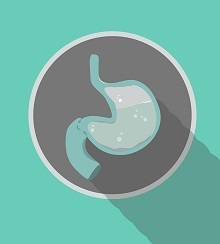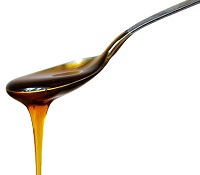stomach ulcers
5 Facts about Stomach Ulcers (Home Remedy Included!)
1. What is Stomach Ulcer?

Stomach ulcers, also known as gastric ulcer or peptic ulcer, is a lesion that forms in the lining of the stomach.
Doctors used to believe that stressful lifestyle and poor diet caused ulcers. Later, it was discovered that an off-balance between digestive fluids (hydrochloric acid and pepsin) resulted in ulcers.
2. What Causes It?
Today, research shows that most ulcers develop as a result of infection with a spiral-shaped bacterium found in the stomach called Helicobacter pylori (H. pylori). The bacteria can also attach to stomach cells, further weakening the stomach’s defensive mechanisms. For reasons not completely understood, H. pylori can also stimulate the production of acid in the stomach and cause tissue damage and inflammation, which may finally result in an ulcer.
3. What are the Symptoms?
Stomach ulcer causes burning sensations in the abdomen behind the breastbone which can be especially painful when the stomach is empty. Other symptoms include belching, nausea, fatigue, heartburn, vomiting, chest pain, bleeding, and loss of appetite and weight.
4. Any Suggestions for Relief?
Antacids and antibiotics are used to treat such infection, but today the bacteria is growing increasingly in resistance to antibiotics. Alcohol, cigarettes, spicy foods, tea, and coffee are some gastric irritants that should be avoided as they can potentially aggravate ulcer conditions. Taking several small meals throughout the day instead of eating three large meals can be helpful as this translates to less acid production in the stomach at each meal. A high fibre, low carbohydrate diet, and vegetables such as cabbage and broccoli all promote ulcer healing. Also, drinking lots of water can ease ulcer problems.
5. Honey Home Remedy
In seeking natural remedies, many people have testified that taking 1 Tablespoon of raw honey, especially Active Manuka Honey with 1/4 Teaspoon of cinnamon powder on a daily basis can effectively treat stomach upset and clear ulcers in the stomach from the root.
Other Related Pages on Stomach Ulcers

1. Honey, a natural sweetener comprising vitamins, enzymes, minerals, and antioxidants, contains a number of fermentable carbohydrates including a variety of oligosaccharides that can function as prebiotics. More in: 1 Glass of Milk and Honey a Day Keeps the Doctor Away!
2. Honey could be an answer to the serious, growing problem of superbugs that have built up resistance to conventional antibiotic drugs due to overuse. Read: How Honey Fights Infection
3. Many studies on honey have drawn comparisons with the activities of conventional antibiotics and proven the antibacterial activity of honey and its effective use in the treatment of infection and diseases. More in: The Tastiest 100% Natural Antibiotic – Honey
4. Tested positive for H. pylori bacteria in your blood test? Use alternative natural medicine like Manuka honey and propolis as a treatment regimen as they may prove to be more effective and reliable than conventional drugs: 2 Natural Cures for H. Pylori – Thanks to Bees
5. Antibiotic resistance occurs when the bacteria mutate and develop the ability to defeat the drugs and chemicals designed to cure infections, causing treatments to lose their effectiveness. Biocides commonly used as disinfectants and preservatives were found to be a key factor in increasing antibiotic resistance of pathogenic bacteria. More in: Could Honey Replace Traditional Antibiotics? Good News!
6. Today science has acknowledged Manuka honey as medicine for its exceptional antimicrobial properties. Details in: Manuka Honey as Medicine.
7. Bee propolis has been used as a natural healing agent for many centuries because of its antibacterial, antifungal, antiviral, anti-inflammatory effects. Details in: 7 Things to Know About Anti-Cancer Propolis (#4 is Impressive).